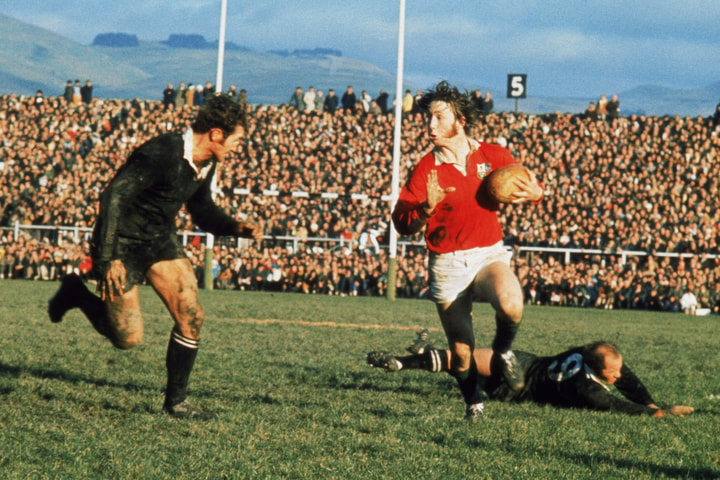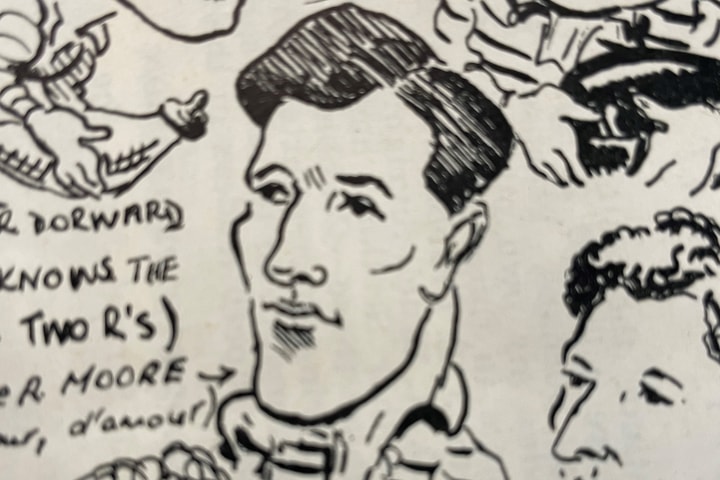English Rugby throughout the amateur era always relied on charismatic loyal figures who gave great service to their clubs and rugby in their counties and regions long after their playing careers had ended.

From The Vaults
Lieutenant Colonel Joseph Brunton DSO, MC
Such a one was Lieutenant Colonel Joseph Brunton DSO, MC who earned distinction on the battlefields of Europe during World War One but had already earned fame as a rugged forward for North Durham, Northumberland and England before the war.
Born on August 21st 1888, he won three caps for England in Ronald Poulton's Grand Slam winning side of 1914 although he missed the final match against France in Paris.

Joe Brunton made his debut for Northumberland against Cumberland in October 1912 and attracted the attention of the England selectors early in the 1913-14 season. He played for the North against England in a closely fought trial match at Gosforth in December and was then selected in the pack for England in the final trial against The Rest at Twickenham on January 3rd 1914. An overwhelming 42-27 victory for the England XV secured his place in the opening Championship match against Wales.
A curiosity of this trial match was that Brunton's fellow Northumberland winger, the powerful Alan Roberts, scored two tries for The Rest in the first half and, having changed sides on the instructions of the selectors, two more for England in the second half. This helped to restore him later in the season to the left wing position for his eighth and final cap against Ireland.
Joe Brunton was only the second player from North Durham to be capped following the forward Jack Hall twenty years earlier. A newspaper of the day described Brunton in glowing terms:
"The North Durham man is a sturdy, hefty scrummager; a tireless unselfish player, a sportsman to the tips of his fingers and the possessor of a close knowledge of the game."

England v Scotland, 1914
As events turned out, his final international appearance was against Scotland at Inverleith in a legendary match which England won 16-15 by the tightest of margins. Any further English international honours he might have achieved on the rugby field as a player were denied by the outbreak of war.
He served throughout the war in the Seaforth Highlanders in 1914-15 and the Northumberland Fusiliers Service Battalion from 1915-1919, rising to the rank of Lieutenant Colonel. His outstanding bravery in action in France was recognised with the award of the Military Cross and bar during 1916, followed by the award of the Distinguished Service Order for "distinguished gallantry and devotion to duty" in October 1918. Mentioned three times in official dispatches making him one of the most highly decorated rugby internationals of the 1st World War, he was described by his army commander as "a born leader of men and a soldier of the highest order".
He was to have only one more season of high class rugby when he resumed his playing career post-war. As an experienced member of the Mother Country team alongside such fellow English internationals as scrum half John Pym and the forwards Leonard 'Bruno' Brown and Charles 'Cherry' Pillman, he played in five of their six matches against Australia, the RAF, Canada, New Zealand and South Africa in the Victory Cup series of 1919. He only missed one match, the final play-off return match against New Zealand, due to injury.
He re-joined his hometown club Rockcliff in 1920 and made one final appearance for Northumberland before retiring as an active player. Like many former players, he took up refereeing and became one of a small number of old internationals who subsequently became international referees. He refereed the match between Durham County and the touring All Blacks in October 1924 and took charge of the international match between Wales and the invincible All Blacks at St Helen's Swansea a month later on November 29th 1924.
He continued to support the cause of rugby union for the rest of his life. He became President of the Northumberland Rugby Union in 1928-29 and rose to be President of the Rugby Football Union in 1953-54. He was also elected a life member of Rockcliff RFC during the 1955-56 season. A lifetime of service to the game ended when he died on September 18th 1971.

about the author
A professional musician and arts administrator, Richard Steele has been on the committee of the World Rugby Museum at Twickenham since 2005 and is the co-author of the RFU's 150th anniversary book England Rugby 150 Years.




